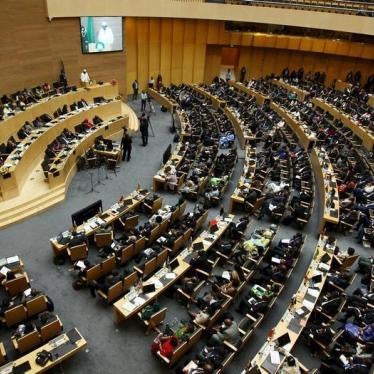As the European Union is organizing a conference in Brussels to discuss priorities for the Central African Republic (CAR), the undersigned 17 international and Central African human rights organizations call on states and international organizations to urgently pledge financial and technical support to the Special Criminal Court (SCC). We further call on the international community to support efforts by the Central African authorities to take leadership and guide efforts to effectively operationalize the SCC.
Grappling with the CAR’s longstanding history of impunity for crimes under international law, and considering the numerous challenges facing the country, justice must remain a priority. Holding perpetrators to account in fair trials —and in doing so, exposing the truth behind the commission of crimes—can help end cycles of violence, and have a lasting impact on peace and reconciliation.
The Central African Republic faces a difficult security situation, which has deteriorated in recent months. Nonetheless, in September, President Touadera reassured the UN General Assembly that the Central African Republic has “turned its back on past dark days,” and reaffirmed his government’s commitment to ending impunity. The international community should maintain its sustained commitment to the Central African Republic, and to justice, in particular, to ensure the country does not descend into another crisis.
The Central African justice system remains too weak to effectively investigate and prosecute mass atrocity crimes. The International Criminal Court’s investigation in the Central African Republic offers victims another much-needed path to justice, but simply cannot address more than a decade of crimes under international law, as it will likely target only a small number of suspects. The SCC, with its complement of international and national staff and expertise, has the potential to deliver much-needed justice to the many victims of crimes under international law since 2003. Moreover, a strong, functional SCC can have a positive impact on the Central African judicial system, in terms of sharing expertise, strengthening capacities and showing that credible justice is possible.
But to realize its potential, donor support for the SCC is crucial.
Funding for the Special Criminal Court
Strong investigations help determine the success of the steps that follow. Indeed, cases built on a solid evidentiary foundation, followed by trials that are and are seen to be fair, help inspire confidence in the rule of law.
Security for core judicial staff is also important; judges, prosecutors, and lawyers cannot effectively do their jobs if they fear for their safety. Protection for victims and witnesses is similarly critical. Making legal aid available to victims means they can exercise their right to participate in proceedings, while legal aid for indigent defendants can help ensure the fairness of the proceedings. At all stages, effective outreach can promote awareness of the court’s role and functioning, manage expectations, and contribute to building national ownership over the justice process.
Over the next five years, the SCC is estimated to cost 40 million USD. Of that amount, only 5 million USD has been raised, leaving a funding gap of 35 million USD. We urge donors to ensure continued engagement with the SCC as the court works to fulfill its mandate.
Staffing
As we have highlighted in a previous statement, the recruitment of qualified, independent, and motivated national and international personnel will help determine the Special Criminal Court’s success.
It is expected the recruitment process for international staff will soon be underway, including for the magistrates, the investigating judges, the prosecutor, and the deputy registrar. We urge your governments to propose the most qualified candidates for the positions, and to press for a transparent selection process that prioritizes competence above other considerations.
Recruited judges, consultants, and experts should speak French and be familiar with the civil law system, on which the Central African judiciary system is based. Judges should have expertise in investigating and prosecuting crimes under international law. The deployment of international judges, consultants, and experts who do not have the necessary prior specialized experience investigating and trying crimes under international law can be counterproductive and undermine the court’s legitimacy.
Similarly, we look to the Central African authorities to show leadership and ongoing political support to the SCC, which should translate into concrete steps such as the appointment of qualified national staff.
The Central African Republic is facing many challenges, including demobilizing combatants, security sector reform, and the protection of civilians, as it struggles to rebuild after years of conflict. However, bringing perpetrators of the worst crimes to justice in credible trials should be at the forefront of the international community’s priorities. We hope your government or intergovernmental organization will provide financial, technical, and political support to the SCC as outlined above.
Bangui, November 16, 2016
The organizations supporting the declaration are:
Action des chrétiens contre la torture (ACAT - RCA)
Amnesty International
Association des femmes juristes de Centrafrique (AFJC)
Association des victimes de la LRA en Centrafrique (AVLRAC)
Avocats Sans Frontières
Civis et démocratie (CIDEM)
Commission episcopale Justice et Paix
Enough Project
Fédération Internationale des Droits de l’Homme (FIDH)
Human Rights Watch
Lead-Centrafrique
Ligue centrafricaine des droits de l'Homme (LCDH)
Mouvement pour la défense des droits de l'Homme et de l'action humanitaire (MDDH)
Observatoire centrafricain des droits de l'Homme (OCDH)
Observatoire pour la promotion de l'Etat de Droit - OPED
Parliamentarians for Global Action
REDRESS








